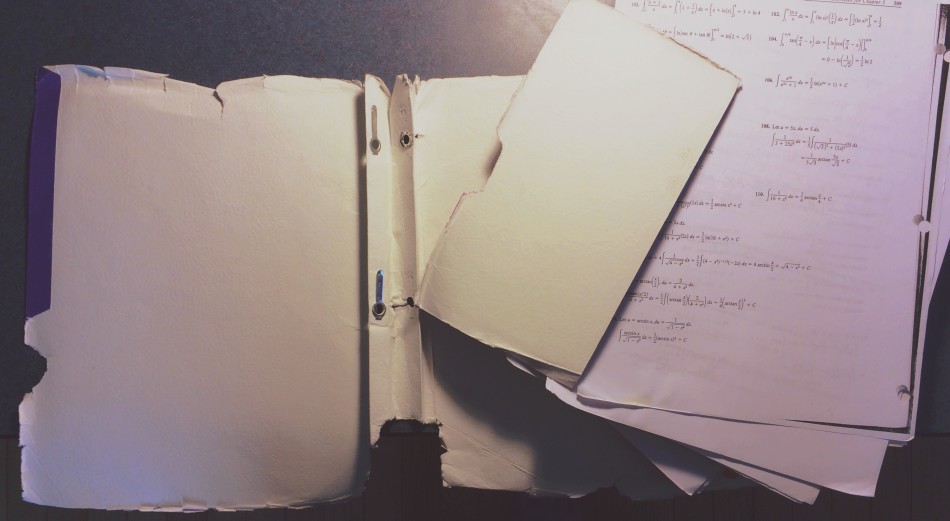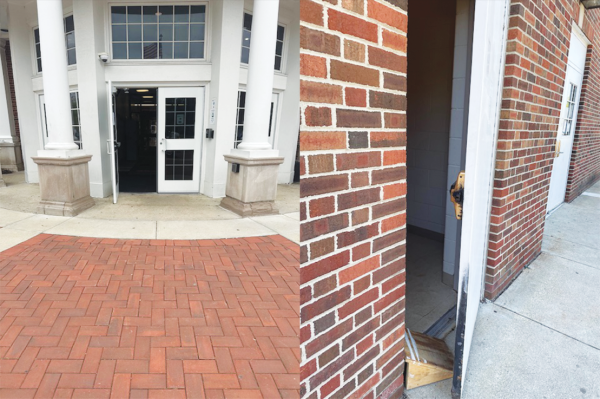Folder Philosophy
McKeon: A math folder remains a math folder even if there is one tear, but how many tears until it ceases being a math folder?
My math folder has seen better days.
It started out pristine, a two-pocket cardboard folder for Calculus; the worst thing about it was its purpleness, which contradicted my lifelong coordination with math and blue.
Over time, though, it’s eroded. Worksheets, syllabi and handouts have broken down the folder; one of the rectangular pockets split from the inside cover, leaving nothing to hold half of the papers in place. If I lift it without holding the papers and folder together, its contents spill. The other pocket will break soon, and the “spine” of the folder is nearing the literal breaking point.
I realize the easy answer is to get a new folder. But that’s no fun. With 10 weeks until senior project, the challenge of maintaining the folder until May 9 is more appealing than the ease of replacing it. So I’m keeping it, tears and all.
But it got me wondering: at what point in this erosion does my folder cease being a folder? How many tears and detachments must occur before it is no longer a folder, but instead many pieces of purple cardboard?
It’s a literally age-old question, dating back more than 2,000 years to Greek philosopher Eubulides of Miletus, a contemporary of Socrates. Instead of a folder, Eubulides philosophized with a hypothetical heap of sand.
He presented two premises: first, a large number of grains of sand (say, 100,000) taken together constitutes a heap of sand; second, if you remove one grain of sand from a heap, the heap remains a heap. Let’s assume these are true.
If we repeatedly apply the second premise — removing one grain, then another, then another — we eventually remove 99,999 grains of sand, leaving one grain. If we agree the second premise is true — i.e. a heap minus one grain is still a heap — this one grain is still a heap.
But this is obviously false. No logical person would consider a single grain of sand a heap. All we did, though, was apply our premises; why the false result?
Eubulides called this the sorites paradox, and it’s baffled logicians for centuries. After sustaining continuing erosion, at what point does an object cease being itself?
So 100,000 grains definitely constitute a heap of sand, yes, and one grain definitely does not. But how many grains must we subtract from 100,000 to make the heap not a heap? How many grains must we add to one to make it a heap?
Your gut reaction might be to set a fixed threshold that defines a heap. Let’s say a heap is 5,000 grains of sand or more. However, is the difference between 5,000 grains and 4,999 grains so significant that the former is a heap and the latter is not? The difference between the two is so small that it would be illogical to consider one a heap and the other not.
Other philosophers claim that there are three, not two, options: heap, not heap and indeterminate. Indeterminate would be a hypothetical in-between quantity; this allows for gray area that solves the 5,000/4,999 problem. However, this creates a two new problems: where is the line between heap and indeterminate, and where is the line between indeterminate and non-heap? We’ve replaced one impossible threshold with two. This solution won’t do either.
So when will my folder cease being a folder? The best answer: when we decide it is. The sorites paradox exists only because language exists, and because we have words to describe different amounts of sand. Without those words, the paradox would not exist.
Words, however, are sometimes too vague to exist without human subjectivity; that is, we must sometimes use our own judgement and make subjective decisions when no objective answer is evident. You must decide subjectively if a certain collection of sand is a heap or not, and not everyone may agree with you. That is the wonderful gift of human consciousness, though, that we may disagree about these things.
We must decide for ourselves, but our decisions must be well-founded, for there is often much at stake. A model student who forgets one homework assignment is still a model student, but how many can she forget before she is not? Your close friend remains a close friend even after one slight, but how many slights before the friendship is ruined? One act of judicial activism does not fully alter The Constitution, but how many tweaks before our constitution is not The Constitution?
There are no objective answers to these questions, but some are better than others. We must find the better ones; you must know where to draw the line.
But I digress. I’ll stick with the folder. Senioritis is too much for me.






Leo Izen | Feb 28, 2014 at 9:13 pm
If I collect two heaps of sand and you collect three heaps of sand, and we put our collections together, how many heaps of sand do we have?
One.